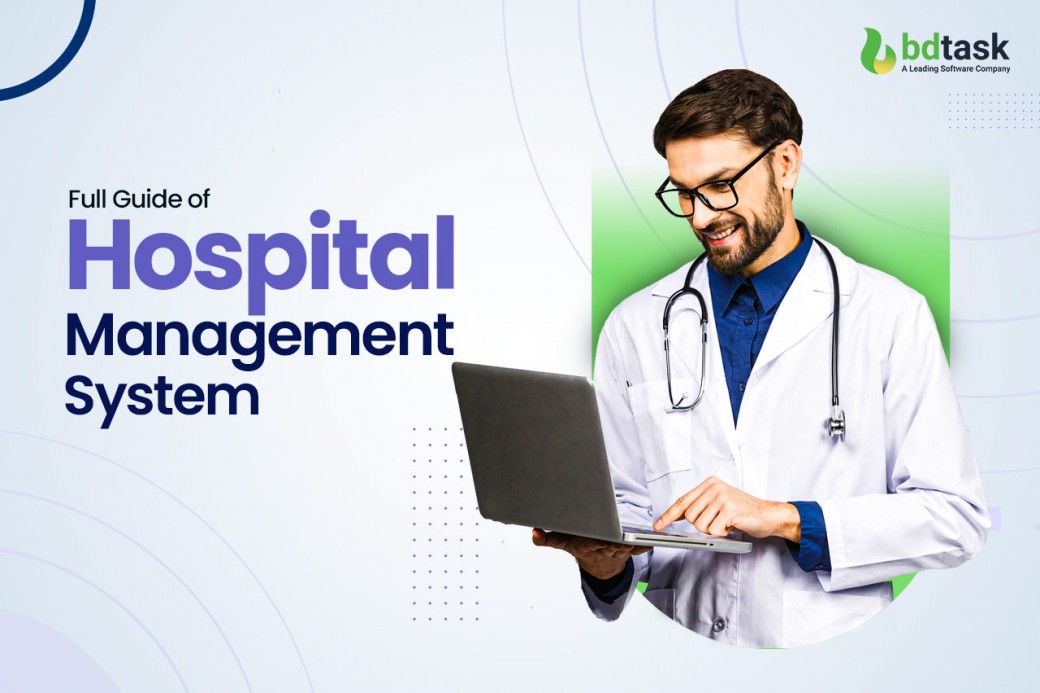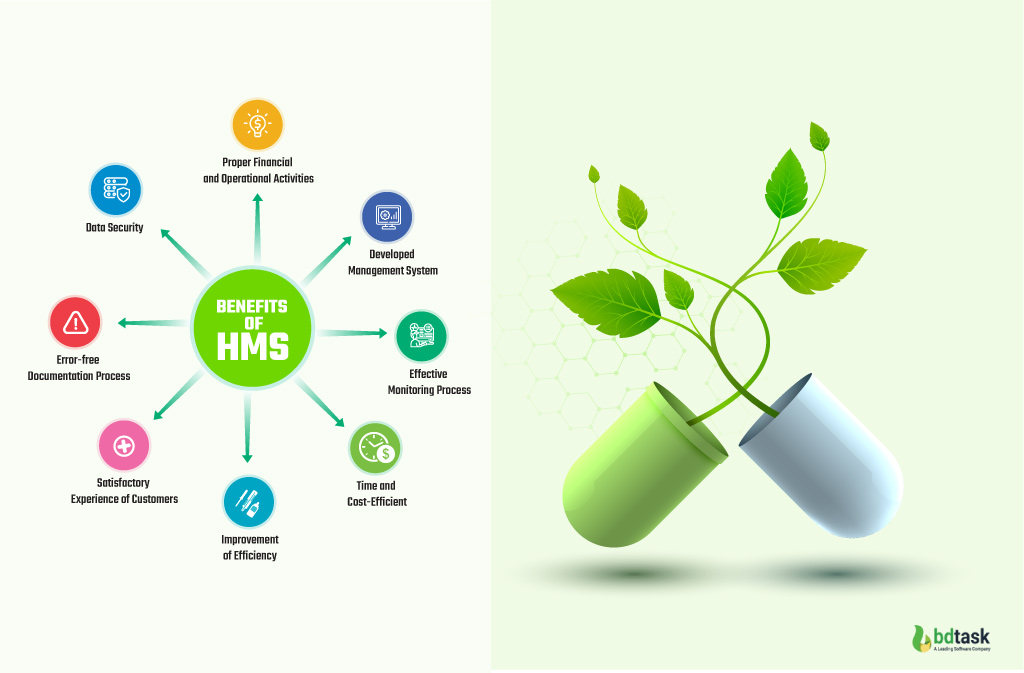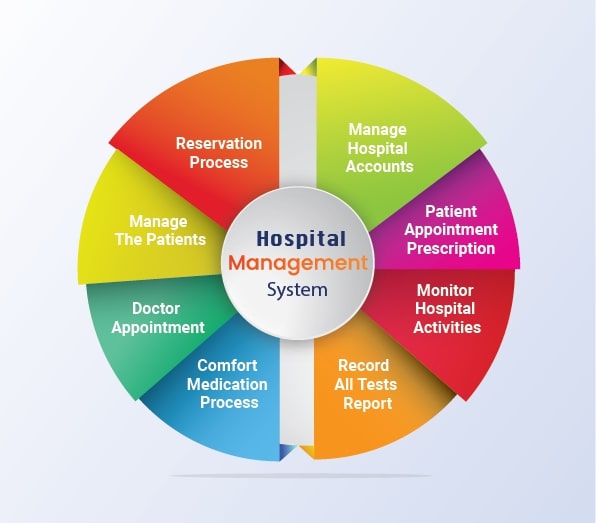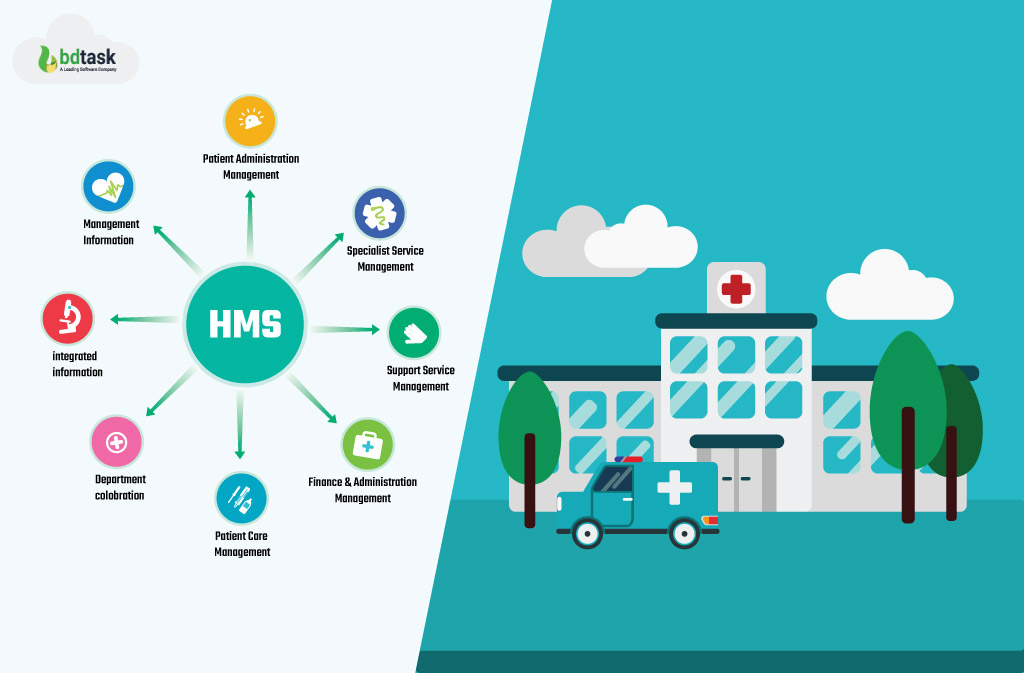Full Guide of Hospital Management System (HMS)

The hospital and care sector contributes remarkably to fulfilling one of the basic needs of human beings. This sector is improving a lot nowadays. The hospital management system helps the care setting conduct its operations and daily activities smoothly.
Thus, healthcare sector owners can effectively regulate essential tasks, and service users can get satisfactory care services.
In this blog, we will get a total overview of the hospital management system and its essential features and benefits.
So let's start fresh.
What is a Hospital Management System?
An advanced system or software that assists healthcare services in managing all administrative activities, including
- Maintaining hospital workflow
- Handling patients
- Dealing with the financial and accounting workforce
- Recording all critical data and other essential operations
- Billing system in hospital
- Prescription management & more
All of that work is handled easily with this Hospital Management System. Clinical management systems also help in the decision-making process of the care setting. Besides, the hospital information system plays an inevitable role in analyzing the hospital's relevant data. So you can quickly evaluate your clinic's revenue cycle.
List of Departments of Hospital
The medical setting has several functional departments that conduct different mandatory operations. Different departments can be categorized into two, like inpatient wards and outpatient wards.
1. Inpatient Department
Intensive Care Unit
The ICU department is maintained by specially trained and skilled professionals. Patients in critical condition who need life support are admitted to this department. Pediatric, cardiovascular, and neonatal ICU are three divisions of intensive care units.
Emergency Department
Patients who require immediate medical action are admitted to the emergency department, which includes different units for surgery, burns, trauma, etc.
Neurology, Oncology & OB Department
Patients with cancer, neurological issues, pregnancy, etc., get care support from these specialized departments.
Cardiology Department
This department of a hospital has to be aware of the service. Patients with heart problems receive care from the cardiology department. The patients need to be continuously monitored, as blood circulation issues can cause death.
2. Outpatient Department
Medical Record
This department regulates a hospital's documentation process. The medical record department's vital task is recording every individual's data as a care setting service user or service provider.
Radiology
In this department, some diagnostic procedures are regulated, including X-rays, MRIs, CT scans, etc. Depending on the test results, patients are treated. So, it is a vital department of a hospital.
Pharmacy
The pharmacy department provides prescribed medicines to the hospital. Skilled and licensed pharmacists maintain this department.
Laboratory
Different tests are conducted in the laboratory, including stool, urine, biopsy, and blood tests. Pathological tests are done to identify the disease's etiology.
Why is the Hospital Management System (HMS) Necessary?
The hospital has to maintain several departments and their operations properly. Every department is essential. If any of the departments do not conduct their activities, other departments are affected negatively.
Hospital management software is a must in the present era. A massive staff is required in the hospital to serve the patients properly. Hospital billing software is required in the care setting too.
There is a lot of work that can done quickly if you have a hospital management system in your hospital, including:
- Maintain the workforce of the care
- Control every department functions effectively
- Patients management
- Manage the appointment of the patients
- Maintain the patient's record
- Regulate the accounts and financial section
- Provide adequate support 24/7
Types of Hospital Management Software
Healthcare sectors are improving a lot through the adoption of different management software. Other types of software are provided below-
1. Billing Software
Billing software manages accounts and financial sections of a care setting. Besides, it also helps to manage insurance claims.
2. Electronic Health Care System
EHR plays an essential role in recording medical data and information. It assures your data protection and safety. It can be integrated with the hospital management system.
3. Hospital Management Software
Hospital management software is a complete solution for a healthcare organization. It helps to maintain all essential operations within a care setting. It can control several sectors of healthcare.
4. Practice Management Software
PMS includes appointment management, electronic health records, billing, etc. Generally, practice management software assists in maintaining a clinic. It is also known as the clinic management software.
5. Lab Information Management System
Every healthcare center has a pathology center where tests and research on different diseases are regulated. The lab information management software manages the equipment availability, sample collection, recording of relevant data, etc.
Benefits of Hospital Management System

Care services benefit from adopting the hospital management system. The effect of hospital information software is significant to the care service sector.
The hospital management software eases the way of operating different departmental functions. There are a lot of advantages to using a hospital management system. Lets check some of them below.
1. Improvement of Efficiency
The hospital billing software will help you improve the efficiency of your hospital. The automation service plays an essential role in increasing the efficiency of the hospital sector.
2. Time and Cost-Efficient
The automation system helps the care setting to complete any task properly within time. Besides, the additional costs are reduced.
3. Developed Management System
The visibility of management increases by adopting the hospital management system website. So, the management system of the care sector is developing.
4. Proper Financial and Operational Activities
Hospital Management Software helps to control financial and tax planning. The billing software controls the profits, losses, expenses, and taxes.
5. Error-free Documentation Process
Recording patients’ and staff's information is essential in a care setting. If you want error-free documentation, hospital management software is a must.
6. Satisfactory Experience of Customers
The hospital management system helps you to maintain a good customer relationship. The patients get proper services, and the procedure of payment is easy in this process. Without facing any difficulties, doctors can provide care services to service users.
7. Data Security
Patient data and confidential information can be stored efficiently, provided the hospital management software is adopted. Research shows that healthcare spend more than 35% of their time in storing patient data.
Besides, important information can be kept securely in the hospital information management system.
8. Effective Monitoring Process
Hospital management software can evaluate the performance of every department. A monitoring process can also be performed. The effective monitoring process helps to improve the efficiency of the care services.
9. Staff Engagement
The hospital management system helps to increase interaction among the workforce. The hospital employees can cooperate in just one click. In this regard, transparency is also enhanced. The specialist also maintains a sound communication system with the care staff.
However, top hospital management software provides several advantages to the healthcare sector. The patients, doctors, and care sector staff all benefit from the hospital billing software.
Apart from that, choosing a hospital management system is a tough job. But don't worry. Our next one will discuss which features you need before selecting a hospital management system.
Features of Hospital Management System (HMS)
.png)

The hospital management system website helps the care settings to conduct all administrative work effectively. The hospital information management software always focuses on the expectations of the care sector. So, according to the requirements of the hospital, the hospital billing software is developed. The key features of the best hospital management system are provided below-
1. OPD and IPD Management System
The outpatient and in-patient departments are vital departments of a care setting. The hospital management system helps you to maintain the OPD and IPD departments effectively. It includes the registration of new patients, history, complaints, diagnosis, next visit, etc.
2. Appointment Management System
Your hospital's patients can get appointments easily, provided the hospital information system is adopted. It helps the care organization to allocate the specialists for the specific patients systematically.
3. Patient Management System
The patient of a care organization is the service user. The effective management of the patients can ensure the success of your care setting. It includes monitoring the patient’s condition, treatment, history of the patient, and reports.
4. Doctor Management System
The doctors of a hospital are the key professionals who serve the patients. The hospital management software helps the doctors to organize their functions and schedules. So they can serve the patients of the care properly.
5. Financial Management System
The financial management system's vital tasks include payment details, hospital financial records, costs, profits, etc. The hospital billing software helps to control the accounts section efficiently.
6. OT Management System
The hospital information system provides you with an operation theatre management system by which you can control this department’s overall activities. You can also be notified of OT activities from time to time.
7. Prescription Management System
Prescriptions for patients are important. The hospital management system helps you to manage the prescription properly. SMS prescription is an advanced system in the care sector.
8. Pathology Management System
The pathology or laboratory is a vital department of a care setting. Lab management software assists in recording test reports, lab data analysis, etc. In addition to this, it also includes credit settlement, custom reports, MIS reports, etc.
9. Pharmacy Management System
The pharmacy management system includes pharmacy stock reports, stock management, integration of prescriptions, etc. The pharmacist can regulate the operation properly by adopting the hospital information system.
10. Human Resource Management System
Workforce management is an essential task. The human resource administration can handle the hospital staff more conveniently, provided that they adopt the hospital billing software. It also includes the recruitment documentation process.
11. Inventory Management System
The inventory management system is an important feature of hospital information software. Stock management helps identify the current stock situation.
12. Multiple Email and SMS Gateway System
The healthcare management system helps to communicate with the patients and the staff of the care setting. It provides an email and SMS gateway system.
13. Insurance Management System
The patients' insurance details' can be recorded in the hospital management system. It is also a significant feature. It includes company insurance, policy no., and other information.
14. App Integration System
The hospital management system allows you to integrate the Android app. It makes the controlling system more convenient.
15. Accommodation Management System
The hospital management system can trace the availability of the room or cabin. Besides, it manages the occupancy status, and the hospital information system maintains different documentation processes.
16. Role Permission Set-Up System
The healthcare management system provides you with an admin panel by which you can control the entire operation of your care setting. It also has a role permission setup system, which provides an access permission system. In this case, one can only perform one’s given sector.
17. Multi-Language and Multi-Currency System
The hospital information system provides you with multiple language support systems. Besides, you can use multiple currency systems while adopting the clinical management system.
18. Case Manager Management System
Case management is a vital task in a care setting. First, the patient’s condition is appropriately evaluated. After discussing the patient's problem, treatment is provided. In this case, hospital information software plays an essential role. The hospital information system helps professionals make decisions rapidly.
19. Real-Time Report System
The hospital management software stores all essential data of the care organization. So whenever the information is required, the software provides the data comprehensively.
20. Customer Support System
Service users face several issues while receiving services from care organizations. The hospital management system helps to provide customer support 24/7.
However, the hospital information system plays an essential role. Without regulating every operation, the care sector cannot provide the required services.
Modules And Functions of Hospital Management Software
The modules of a hospital management system make the software more convenient for the users. A hospital management software must have the below modules.
1. Effective Dashboard
A dynamic dashboard helps you to get notified about the overall activities of your care setting. The weekly report, monthly or yearly information, assists you in evaluating your present situation.
2. Administrative Panel
The admin panel must be well-developed. You can set the job roles of pharmacists, doctors, nurses, researchers, case managers, etc., by using the administrative panel. A superpower administration panel helps you to protect your data privacy.
3. Module for Doctors
Doctors can easily handle different essential functions by using the doctor module. It includes scheduling appointments, patient portals, prescription making, and maintaining other activities.
4. Accountants Module
The accountant's module completes the calculation of profit and loss of care setting. Besides, it also helps to control the monetary flow of the hospital. Moreover, it has an access account creation system.
5. Laboratory Management System
The laboratories module helps you to manage different operations within the lab. You can divide the lab work into various sub-sections like pathology centre, X-ray department, etc.
6. Module for Pharmacists
The pharmacist module helps to maintain the different activities of a pharmacy in a hospital. It includes stock of medicine, buys and sells, financial statements, etc.
7. Patient Portal
The patient portal module helps the hospital to collect the patients’ information appropriately. Besides, this module plays an inevitable role in creating a customer persona. It is one of the essential modules for a hospital management system.
8. Modules for Receptionists & Representatives
The hospital management software must include the receptionist module by which the hospital can manage the appointments and accommodation booking system. Besides, the representative module helps to manage marketing activities.
However, the essential modules and their functions are discussed in the above part. Without those essential modules, the hospital management system will not be a perfect care service solution.
Note: Check the hospital management software that contains every module.

Functional and Nonfunctional Requirements of Hospital Management System
The hospital management system assures of conducting several activities in a care setting. It is important to consider some functional and non-functional requirements of the hospital information systems in this regard.
1. Functional Requirements
The functional requirements include a registration process, report generation, check-out system, and database.
Registration Process of SRS
Registration process includes
- Adding patients
- Providing an Identification number to the patients
Report Development of SRS
The report generation process includes
- Patient information
- Bed availability
Database of SRS
The patients’ necessary information includes first name and last name, personal contact no, postal code, address, patient identification number, etc.
- Basic information about patients
- Patients information update
Check Out of SRS
Check out process includes-
- Releasing the patient
- Deleting the patient ID
- Update the list of beds
2. Non Functional Requirements
The non-functional requirements of a hospital management system include performance, security, reliability, and maintenance ability.
Safety
Security is one of the most important non-functional requirements in a hospital management system. It includes
- The ID no. of patient
- Specific login ID
- The right of the administrator
- The access to receptionists
Maintainability
The hospital management system must have maintenance ability like
- Identification of Error
- Data backup
Effectiveness
The performance of hospital management software includes
- The capacity of the software
- Responding time
- Convenience
- User interface
Reliability
The hospital information system should have the availability and 24/7 support system. However, the hospital management system needs to contain these features to fulfill functional and non-functional requirements.
Costing for Hospital Management Software
The cost of hospital management software is variable. It depends on the size of the practice. Besides, the number of users affects the price of adopting hospital information management systems. You have to consider some crucial factors while estimating the cost.
Continuous software up-gradation is a factor in adopting cloud-based software.On the other hand, you have to pay monthly. Most of the time, startup business processes are free. Moreover, you must buy a license when you purchase the software.
The cost estimation of hospital billing software is difficult. Although you can purchase software through one-time payment, you must buy hardware equipment, including computers or laptops, servers, scanners, printers, etc.
You must consider the implementation cost. It includes installation, IT contractor, workflow, etc.
In addition, the training cost is a must as the hospital management software users should be acknowledged with the system.Suppose you purchase hospital management based on your budget and the requirements. Now you have to consider the facilities that you need. In this case, you can integrate an Android app.
The android or IOS app integration makes your management system more convenient. You have to spend a little more on integrating.
How to Make a Hospital Marketing Plan
An effective marketing plan can assure success. In this case, you have to follow a systematic way of promoting your healthcare.
- First, you have to follow Marketing Strategies and effective techniques. Workable marketing strategies are the guidelines for your marketing operation.
- You must have proper knowledge of the Care Products and Services. You have to make your customers understand your service facilities and the features of your products.
- Do a SWOT Analysis, which helps you identify your strengths, weaknesses, opportunities, and threats.
- Set SMART Objectives. According to the objectives, you have to take your next step.
- You must create Buyer and customer Personas. Because creating a persona helps you to identify the exact requirements of the target customers or buyers.
- At last, conduct Gap Analysis. It will help you to review your plan. Gap analysis identifies your lacking of a plan. So you can easily overcome your difficulties by fixing the gap.
If you follow the mentioned marketing plan step by step, you can achieve your desired objectives and goals.
Finishing Line
Nowadays, the adoption of hospital billing software is increasing considerably. This is because care service providers benefit from using the hospital management system website. The staff, nurses, and doctors must be managed efficiently in the care sector. Otherwise, service users cannot get the desired services.











